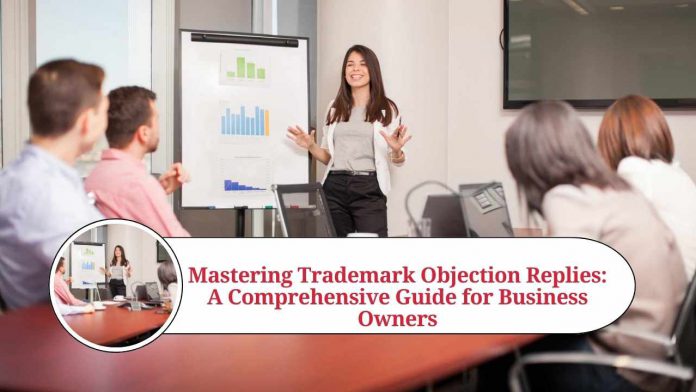Introduction
Trademarks play a crucial role in protecting a company’s brand identity and distinguishing its products or services from competitors. However, obtaining a trademark registration is not always a smooth process. There may be instances where the trademark office raises objections to your application. When faced with a trademark objection, it is important to respond promptly and effectively. In this blog post, we will guide you through the process of crafting a compelling trademark objection reply.
Understanding Trademark Objections
Trademark objections are official notifications from the trademark office, highlighting issues or concerns regarding your trademark application. These objections can arise due to various reasons, such as similarity to existing trademarks, lack of distinctiveness, descriptive or generic nature of the mark, or failure to meet specific legal requirements.
Key Elements of a Trademark Objection Reply
- Thoroughly Analyze the Objection:
Carefully review the objection letter to understand the specific grounds on which your trademark application has been objected. Identify the exact points of contention raised by the examiner. This analysis will help you tailor your response accordingly.
- Research and Gather Evidence:
Support your reply with comprehensive research and evidence. Conduct a thorough search to identify any existing trademarks that might be similar to yours. Gather evidence that demonstrates your mark’s distinctiveness, such as customer testimonials, sales figures, advertising materials, or any other relevant data that showcases your brand’s unique identity.
- Address Each Objection Clearly:
Break down the objections raised in the letter and address them individually in your response. Provide detailed explanations, legal arguments, and supporting evidence for each objection. Clearly articulate how your mark is different from any conflicting marks and why it should be considered distinct and eligible for registration.
- Legal Basis and Precedents:
Incorporate relevant legal provisions, statutes, and case precedents to strengthen your arguments. Cite specific sections of trademark laws or landmark judgments that support your claim. This demonstrates your understanding of the legal framework and adds weight to your response.
- Professional Language and Tone:
Maintain a professional and respectful tone throughout your reply. Craft your response in a clear, concise, and persuasive manner. Avoid any confrontational language or personal attacks. A well-written, professional reply can leave a positive impression on the examiner and increase your chances of success.
- Seek Legal Assistance if Required:
If you find the objection complex or challenging to address, consider seeking legal advice from a qualified intellectual property attorney. They can provide expert guidance and draft a strong objection reply on your behalf, leveraging their knowledge and experience in trademark law.
- Timely Submission:
Adhere to the specified deadline for submitting your reply. Failing to respond within the given timeframe may result in the abandonment of your application. Ensure that your response is submitted well in advance to account for any potential delays.
Conclusion
Dealing with a trademark objection can be a daunting task for any business owner. However, with a systematic approach and a well-crafted objection reply, you can effectively overcome these obstacles and secure your trademark registration. Remember to thoroughly analyze the objections, gather strong evidence, address each point individually, cite legal provisions and precedents, maintain a professional tone, and submit your response within the stipulated time frame.
In case you feel overwhelmed or require additional assistance, it’s advisable to consult an experienced intellectual property attorney who can provide expert guidance and support throughout the objection reply process. By mastering the art of trademark objection replies, you can protect your brand and set a strong foundation for your business’s success.
Read more useful content:
Frequently Asked Questions (FAQs)
- What is a trademark objection?
A trademark objection is a formal notice issued by the trademark office, pointing out issues or concerns regarding a trademark application. It highlights the grounds on which the examiner believes the mark does not meet the requirements for registration.
- Why do trademark objections occur?
Trademark objections can occur due to various reasons, including similarity to existing trademarks, lack of distinctiveness, descriptive or generic nature of the mark, violation of specific legal requirements, or incomplete application documentation.
- How should I respond to a trademark objection?
To respond to a trademark objection, carefully analyze the objection letter, gather relevant evidence, address each objection individually in a clear and concise manner, provide legal arguments and precedents, and maintain a professional tone throughout the reply. It is advisable to seek legal assistance if you find the objection complex or challenging to address.
- Can I handle a trademark objection reply myself, or should I hire an attorney?
While it is possible to handle a trademark objection reply yourself, seeking the assistance of an experienced intellectual property attorney is highly recommended. They possess the necessary expertise to navigate the legal intricacies, provide guidance, and draft a strong objection reply on your behalf, increasing your chances of success.
- Is it necessary to respond to a trademark objection?
Yes, it is crucial to respond to a trademark objection within the specified time frame. Failure to respond may result in the abandonment of your application, rendering it ineligible for registration.
- What if I disagree with the trademark objection?
If you disagree with the trademark objection, you should provide well-reasoned arguments, supported by evidence, to counter the objections raised. Cite relevant legal provisions and precedents to strengthen your case. However, it is important to approach the response in a respectful and professional manner.
- How long do I have to respond to a trademark objection?
The time frame for responding to a trademark objection is typically specified in the objection letter. It is crucial to adhere to the provided deadline and submit your response within that time frame to avoid potential application abandonment.
- What happens if my trademark objection reply is accepted?
If your trademark objection reply is accepted, it means the examiner is satisfied with your response and has withdrawn the objection. Your application will proceed to the next stage of the registration process.
- Can I appeal a decision made after a trademark objection reply?
Yes, if your trademark objection reply is not successful, you have the option to appeal the decision. The appeal process may vary depending on the jurisdiction, and it typically involves presenting your case before an intellectual property tribunal or court.
- How long does it take to resolve a trademark objection?
The time it takes to resolve a trademark objection can vary depending on various factors, including the complexity of the objection, the workload of the trademark office, and the jurisdiction. In some cases, it can take several months to a year or more to reach a resolution. Patience and persistence are essential during this process.




















